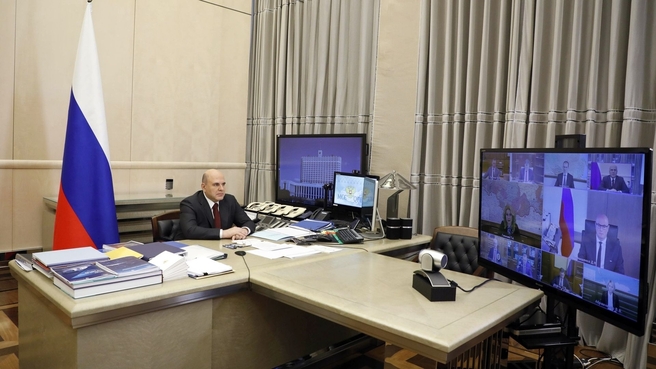The agenda includes the results of a working visit to the Chechen Republic; connecting private houses and small businesses to the electricity distribution networks; organising children’s summer leisure; and reimbursing parents for half of what they spent on vouchers to children’s summer camps.
Excerpts from the transcript:
Mikhail Mishustin: Good afternoon, colleagues. Last week, we paid a working visit to the Chechen Republic. The region is developing dynamically, they are implementing numerous medical and educational projects and building new roads, schools and hospitals. In other words, they are creating favourable conditions for a comfortable life. During our trip, we spoke with local residents, students and doctors and visited a number of socially important facilities, primarily educational institutions. So far, Chechnya ranks among those regions where children study in three shifts. We have to eliminate this problem as quickly as possible, and not only in this Russian region. The Government is helping resolve this matter. The republic is doing a lot, so that young people will be able to display their talents, to receive a good education and profession and to work on promising projects. We became convinced of this yet again, while visiting the Grozny State Oil Technical University. Its students conduct interesting research that will be able to have serious practical applications and benefit the entire country. Some top-level projects are so impressive that they don’t resemble the work of students. It is necessary to more actively introduce the practical experience of startups in our higher education system, so that more of these projects appear, and so that young people will be able to put their ideas into practice.
While meeting with students, we discussed various issues of concern to them in detail, primarily employment opportunities for college graduates. It is important that young people should learn regional professions that are in great demand. The republic should formulate a comprehensive programme for training personnel with a secondary professional education. The Ministry of Education will compile this document together with other specialised agencies and the Government of the Chechen Republic. They have already received the relevant instruction. We also visited a perinatal centre in Grozny where dedicated and truly professional doctors work. They help mothers and their newborn babies. It is important to provide them with the required high-tech medical equipment. The Government will help the republic resolve this issue.
Colleagues, we will continue to pay working visits to Russian regions. These visits make it possible to observe the local situation and assess how federal allocations are being spent. It is very important to obtain feedback and to find out what people think about our work and about the local government.
Mr Grigorenko (Addressing Dmitry Grigorenko), it is necessary to rapidly compile a list of instructions based on the outcome of our trip to the Chechen Republic and to add all decisions that we have adopted, including those following meetings with medical personnel, students and the higher education institution’s staff.
Please oversee this work.
I would like to mention one more decision. The Government will considerably reduce the time limit for connecting private homes and small businesses to power networks within city limits and in the countryside. The cost of this service will remain the same. From now on, it will be possible to connect to power networks within a month, rather than within four months as previously. The new regulation applies to all situations in which power transmission lines are located less than 15 metres from any building. This is most often the case, and it will save people and businesses from excessive red tape.
I consider it necessary to discuss yet another issue today, namely, organising children’s leisure this summer. We have recently discussed this issue at our meeting. Children should relax outdoors this summer with minimal infection risks. However, it is still possible to contract the coronavirus. This past March, Rospotrebnadzor drafted amendments to sanitary regulations, which will allow more children to go to health improvement facilities.










